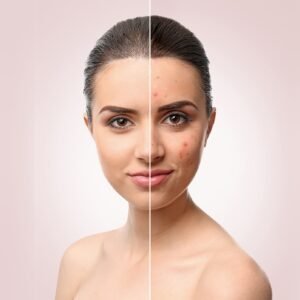Adderall, a stimulant medication composed of amphetamine and dextroamphetamine, is widely used to treat Attention Deficit Hyperactivity Disorder (ADHD) and narcolepsy. While it can greatly improve focus and attention, some users report experiencing skin-related side effects, such as acne breakouts. This article delves into the possible connections between Adderall and acne, examining potential causes and ways to manage this side effect.
How Adderall Works
Adderall primarily works by increasing levels of neurotransmitters like dopamine and norepinephrine in the brain, which enhance focus, attention, and alertness. However, like all medications, it can affect various bodily systems, sometimes leading to unintended side effects.
Understanding the connection between Adderall and acne requires examining the different ways the medication influences the skin, hormonal balance, and stress levels.
Acne and Its Causes
Acne is a common skin condition that occurs when hair follicles become clogged with oil (sebum) and dead skin cells, leading to inflammation and the formation of pimples, blackheads, or cysts. It can be triggered by various factors such as:
Hormonal Changes:
Hormonal fluctuations can increase oil production in the skin, contributing to acne.
Stress:
Stress is known to aggravate acne by triggering the release of cortisol, a hormone that can worsen inflammation and increase oil production.
Diet and Lifestyle:
Poor nutrition, dehydration, and a lack of sleep can also exacerbate acne.
Understanding how Adderall impacts some of these factors can help clarify its potential role in acne breakouts.
Potential Mechanisms Behind Adderall-Related Acne
While research on the direct link between Adderall and acne is limited, Does adderall cause acne, some plausible explanations for this side effect have been suggested based on how the medication affects the body:
Hormonal Imbalance:
Adderall’s stimulant properties can indirectly affect hormone levels, particularly through its impact on the body’s stress response. Increased levels of stress-related hormones, such as cortisol, may contribute to an imbalance in androgen levels. Androgens, particularly in excess, can stimulate sebaceous glands to produce more oil, which may lead to clogged pores and acne.
Increased Stress and Anxiety:
For some users, Adderall can lead to heightened stress, anxiety, or agitation due to its stimulating effects. These emotional responses can trigger the release of cortisol, which can worsen or initiate acne breakouts. In people already prone to stress-related acne, Adderall may exacerbate the condition.
Dry Skin:
While acne is often associated with oily skin, Adderall can sometimes cause dry skin, which might seem counterintuitive. Dry skin can trigger the body to produce more oil to compensate, leading to clogged pores and acne. Additionally, dry, irritated skin can become more prone to inflammation, contributing to breakouts.
Dietary and Lifestyle Changes:
Adderall can suppress appetite, which may result in nutritional deficiencies. A lack of essential vitamins and minerals like zinc, vitamins A and E, and omega-3 fatty acids can affect skin health and make acne worse. Additionally, Adderall may disrupt sleep patterns, and poor sleep has been linked to increased inflammation and acne flare-ups.
Managing Acne While on Adderall
If you suspect that Adderall is contributing to acne breakouts, several steps can be taken to manage the issue:
Consult Your Healthcare Provider:
If acne becomes a persistent issue, it’s essential to consult your doctor. They may suggest adjusting the dosage of Adderall, switching to a different medication, or adding acne-specific treatments.
Maintain a Healthy Skincare Routine:
Keeping your skin clean and moisturized is crucial. Look for non-comedogenic (non-pore-clogging) cleansers and moisturizers. Using products containing salicylic acid or benzoyl peroxide may help control acne.
Monitor Stress Levels:
If you notice increased stress or anxiety while taking Adderall, consider incorporating stress-management techniques into your routine. Meditation, exercise, or relaxation exercises may help lower cortisol levels and, in turn, reduce acne flare-ups.
Stay Hydrated and Eat a Balanced Diet:
Make sure you drink plenty of water and maintain a nutritious diet, even if your appetite is suppressed. Eating foods rich in vitamins and antioxidants, such as fruits, vegetables, and nuts, can promote healthier skin.
Get Enough Sleep:
Maintaining good sleep hygiene is crucial, as lack of sleep can worsen acne. Try to establish a consistent sleep routine to ensure your body has time to rest and recover.
Conclusion
While a direct scientific link between Adderall and acne is not well-established, several plausible mechanisms suggest that the medication may contribute to breakouts in some individuals. Factors like hormonal changes, increased stress, dry skin, and lifestyle disruptions can all play a role in triggering or worsening acne. If you’re experiencing acne while taking Adderall, it’s essential to discuss this with your healthcare provider and adopt a proactive approach to managing your skin health. With the right strategies, it’s possible to minimize the impact of acne while continuing to benefit from the medication’s effects on focus and attention.
